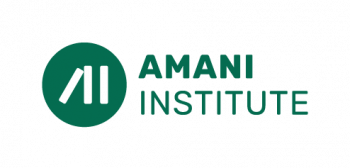(All photos courtesy THNK)
Blood tests on your smart phone. Clothes made of LED lights that turn you into walking social media. Powering your kitchen from your own poop. Avatars. Swarms of robots where the whole is greater than the sum of the parts. The Internet of Things. And perhaps wildest of all: movable, electronic tattoos.
These are some of the technologies – or in other words, the way the world is about to change – that we were given sneak previews of at THNK. The Amsterdam School for Creative Leadership, in which I (and the The Amani Institute) have been chosen to participate in the founding class.
Walking on Water
Having just returned from Amsterdam after the first session of the program, I’m struck by the sensation that things may never be the same. One of my classmates, Ben Keene, wrote an evocative blog post about the way the week was structured, and I won’t attempt to match his chronicle, but do check it out. Ben was struck by the constant refrain at THNK, “having your head in the clouds and feet on the ground”.
And yes, we did start off by walking on water too. For 11 km on Day 1 of the program, we hiked across the UNESCO World Heritage portion of the North Sea. It was a trek as laden with leadership metaphors (“make your own path because stepping into others’ footsteps bogs you down” or “if you stop moving forward, you start sinking”) as were we with our backpacks filled with food and warm clothing. We ate lunch standing upright on a little island of mussel rocks with land blurry behind us on the horizon – also a first.
Over the course of the week, we learnt and practiced so much that will help us become better agents of change: how to know the difference between the form of your passion (which changes) and the essence of it (which endures); how to think before acting (Socratic Dialogue = left brain workout) and how to act before thinking (Improv Comedy = right brain workout); and how to take a problem and stand it on its end (“Re-frame the brief!”) to arrive at truly innovative solutions.
We confronted mind-bending statements such as “It’s not just that the rate of change is accelerating, but the rate at which the ‘rate of change is accelerating’ is itself accelerating.”
Yeah. Take a minute to digest that little chestnut.
Yet what I’ve been thinking about most since I left Amsterdam was what I felt was a central tension in the course – one which is far greater than our little group, and which underpins the next decade, with implications not just for leadership but for education, business, governing, and the quest to leave the planet a little better than we found it.
The World is Ending VS. We Can Be Gods
Two of the most compelling speakers came from the school of thought that we’re destroying the planet, sleep-walking into economic and ecological catastrophe. They were balanced by others who showed how future technologies – like the ones I listed at the start – are going to solve all these problems and forever change the world and how we interact with it.
These competing visions are shaping an era of tension between scarcity of resources (whether financial or material) on one hand and technological abundance on the other. They also bring up serious questions about the ethics of leadership. If we can indeed be Gods and create alternative life forms – e.g. swarms of robots – won’t we inevitably harness that technology for war? We already have individual flying robots (aka drones) causing havoc with civilian casualties – what happens when there’s an army of drones that blocks out the sun? Didn’t we learn anything from the development of the nuclear weapon? Will we never learn that none of us are as cruel as all of us?
This is just one set of questions; there are others, mystical ones that are perhaps even more important: when we become a “quantified self”, don’t we lose some of the spiritual and ethereal parts of us that can never be reduced to mere data, the things that actually make us human? Yet, who can possibly argue with the revolutionary potential of conducting a blood test, and thus diagnosing disease, through your cell phone?
Apart from the gravity of these questions, it was also amusing to see the two camps cross the aisle at certain times, when the dystopians declared utopian dreams such as “ending the nation-state in the next decade” and the utopians revealed dystopian pessimism when, for instance, bemoaning the First World’s inability to keep up with Third World innovation because of “sunk costs in infrastructure”, which could also just be code for that pesky notion of being accountable to your citizens.
Birthing a Tribe
So, these then are the questions at the heart of the THNK program – and ones I’m looking forward to grappling with over the next six months, alongside a truly tremendous group of classmates, staff, and faculty. The Amsterdam School of Creative Leadership is unabashed about declaring that they have set out consciously to create a tribe of accelerated global leaders. And on the last day of the session, when we closed down a nightclub at 4am and still had most of the group (including faculty) awake and ready to keep partying, there was no doubt that the tribe had been born.




